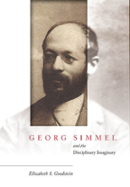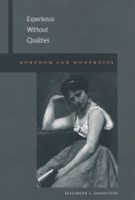Elizabeth GoodsteinProfessor of English and the Liberal Arts
Biography
Elizabeth Goodstein is Professor of English and the Liberal Arts. A member of the Core Faculty in the Department of Comparative Literature and the Program in Psychoanalytic Studies, she is also affiliated with the Departments of Philosophy, History, and German Studies.
Goodstein’s research focuses on the ways modernity and modern subjectivity have been represented, understood, and experienced in European literature and culture since the industrial revolution. Working at the intersections between literary studies, critical theory, and intellectual history, she draws on both classical and modern rhetorical traditions, synthesizing textual analysis, historical interpretation, and philosophical reflection in interdisciplinary explorations of the relations among history and identity, language and experience.
Goodstein’s first book, Experience without Qualities: Boredom and Modernity, addresses the socio-cultural and philosophical significance of the modern discourse on boredom as a lived metaphor for a distinctively modern crisis of self in the encounter with empty, meaningless time. Bringing poets and novelists into conversation with sociologists and philosophers, Experience without Qualities won both the MLA Prize for a First Book and the German Studies Association DAAD Prize and helped catalyze the emergence of Boredom Studies. Work on her next book, Georg Simmel and the Disciplinary Imaginary (2017), was supported in part by the Humboldt Foundation and the American Academy of Berlin. By excavating the philosophical legacy of this pathbreaking and influential thinker, Georg Simmel and the Disciplinary Imaginary exposes interlocking histories of memory and forgetting that illuminate the disciplinary organization of labor in the contemporary university. Her current project, Nothing to Do: Boredom and the Technological Imaginary, explores the political significance of boredom, which anchors the mass-mediated dynamics of attention and desire that fuel consumer society yet can also call the meaning and value of that way of life into question.
Goodstein teaches cultural and critical theory at both graduate and undergraduate levels and welcomes students from all majors and schools who are interested in pursuing cross- and trans-disciplinary inquiry. Courses include: “Imitating Reality,” “Staging the Political: Cultural Criticism and Literary Praxis,” “The Problem of Life and the Philosophy of Life,” “Imagining Modernity,” and “Practicing Theory.” A seminar on “Living through Change” fostered reflection and dialogue across disciplines and schools during the pandemic. In Fall 2023, a seminar on Walter Benjamin’s Arcades Project will provide a space to theorize and develop new interdisciplinary work.
Goodstein is one of the founding co-directors of Emory University's Europe and Beyond Project.
Personal website: www.elizabethgoodstein.com
Selected Publications
“The Silence of Technology,” Philosophy and Rhetoric, 55:1, 2022.
“Boredom, Temporality, and the Historical Dynamics of Abstract Negativity,” in The Dark Side: Philosophical Reflections on the “Negative Emotions, ed. Paola Giacomoni et al, Springer, 2021.
“Simmels Zukunft” in Der Philosoph Georg Simmel, ed Steinbach et al, Karl Alber, 2021.
“Kultur der Moderne” in Metzler-Handbuch Georg Simmel, ed Bohr et al, Metzler, 2021.
“Boredom Studies and the Disciplinary Imaginary,” in The Culture of Boredom, ed. Josefa Ros Velasco, Brill, 2020.
“Thinking at the Boundaries: Georg Simmel’s Phenomenology of Disciplinarity,” in The Germanic Review: Literature, Culture, Theory, 94:2, 2019, 175-187.
“Displacements on a Pathless Terrain: On Reading Kafka’s Der Process,” in Kafka’s The Trial: Philosophical Perspectives, ed. Espen Hammer, Oxford UP, 2018.
“Money, Relativism, and the Post-Truth Political Imaginary,” in Philosophy and Rhetoric, 50: 4, 2017, 483-508.
“Modernism, Relativism, and the Philosophy of Money,” in Money in the German-Speaking Lands, ed. Mary Lindemann and Jared Poley, Berghahn (Spektrum), 2017.
“Between Affect and History: The Rhetoric of Modern Boredom,” in Boredom Studies Reader, ed. Michael E. Gardiner and Julian Jason Haladyn, Routledge, 2017.
Education
B.A. University of Chicago, Ideas and Methods
M.A. University of California, Berkeley, Rhetoric
Ph.D. University of California, Berkeley, Rhetoric


